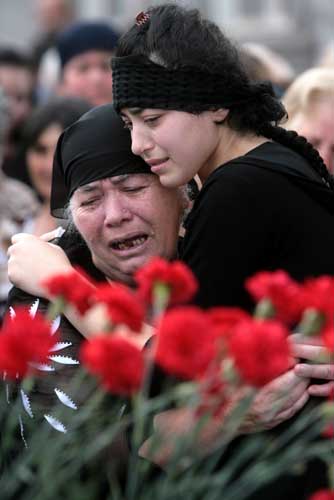Bush sends message to Russia with aid mission to Georgia

America and the EU sent forceful messages of political support to the Georgian government yesterday as they endorsed a French-brokered peace plan following Georgia's humiliating rout by the Russian army.
As President Mikheil Saakashvili accused Moscow of violations of the ceasefire, President George Bush said he would send soldiers to deliver humanitarian aid, meaning that US military planes would be flying into the country considered by Russia as its strategic back yard. The US Secretary of State, Condoleezza Rice, was leaving last night for Paris to assist in diplomatic efforts. She will then fly on to the Georgian capital, Tbilisi.
Ms Rice said: "This is not 1968 and the invasion of Czechoslovakia, where Russia can threaten a neighbour, occupy a capital, overthrow a government and get away with it. Things have changed."
The EU announced it was preparing to dispatch its first soldiers in a peacekeeping capacity to Georgia to support the terms of the agreement, although no date was set. After an emergency meeting of Europe's foreign ministers in Brussels meanwhile, the Foreign Secretary, David Miliband, stressed that a deployment of peacekeepers would require "burden-sharing around Europe".
EU ministers decided that it was urgent to expand the mission of the Organisation for Security and Co-operation in Europe (OSCE) in the troubled Caucasus region. The Georgian government charged that Russian tanks had entered Gori in violation of the ceasefire agreement mediated by the French President, Nicolas Sarkozy, on behalf of the EU the previous day. Mr Miliband said the ceasefire was "fragile" and "could fall apart".
Both sides were urged to honour their commitments to the settlement, which states that neither will resort to force and will end hostilities definitively. The Georgian and Russian leaders have agreed to provide free access for humanitarian aid. Georgian forces are to withdraw to their bases, while Russian forces are to withdraw to the lines held before the outbreak of war last Thursday, when Georgia sought to regain control of South Ossetia by military force. "Russia must keep its word and act to end this crisis," Mr Bush said.
The most controversial clauses of the accord concern the presence of Russian "peacekeepers" who have been deployed in Abkhazia and South Ossetia with international consent for years, but are accused of supporting anti-Georgian separatists. "Pending an international mechanism, Russian peacekeeping forces will implement additional security measures," the accord said.
The French Foreign Minister, Bernard Kouchner, said the agreement reached by Russia and Georgia should be ratified by the UN Security Council to give it the force of international law.
Meanwhile, Britain announced it was joining a US boycott of scheduled four-nation naval manoeuvres also involving Russia and France.
Join our commenting forum
Join thought-provoking conversations, follow other Independent readers and see their replies
Comments
Bookmark popover
Removed from bookmarks